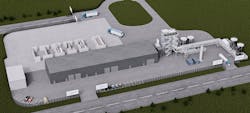igus Investment Paves the Way for Innovative Plastics Recycling Technology
Plastic waste that would otherwise pollute the environment can now be reused as a valuable raw material through a 25-minute chemical recycling process. igus, the Germany-based motion plastics specialist, is helping to support the initiative by increasing its investment in Mura Technology to approximately €5 million.
The investment by igus, which runs its North American operations out of Providence, R.I., amounts to nearly $6 million U.S. dollars. Mura Technology is a pioneer in Hydrothermal Plastic Recycling Solution and is constructing its first recycling plant in the United Kingdom. KBR, another major industrial company, partnered with Mura Technology in January.
Recycling plastic is one of the most pressing challenges of our time. Eight million tonnes of plastic enters the world's oceans1 every year. Much of the plastic is incinerated, and only 14% is recycled. This results in an economic loss of $80 billion per year.
At the same time, new plastic is continuously being produced from petroleum, which is associated with high CO2 emissions. This use already accounts for 6% of global oil production, which is expected to increase to 20% by 2050.2 With the “Hydrothermal Plastic Recycling Solution” (HydroPRS for short) a groundbreaking new technology is waiting in the wings that will enable an entry into a sustainable circular economy for plastics.
HydroPRS has the potential to recycle all types of plastic and prevent plastic from being burned or landfilled and polluting the environment. It is estimated that each tonne of plastic processed via advanced recycling could save 1.5 tonnes of CO2 compared to incineration.
To convert plastic waste into valuable chemicals and oil, HydroPRS uses the Catalytic Hydrothermal Reactor technology (Cat-HTR)—developed by Licella Holdings Limited—using water, heat, and pressure. This method is particularly interesting where mechanical recycling has not been successful so far, for example, with mixed and contaminated plastics.
Valuable Resource Instead of Harmful Waste
The potential for recycling plastic has captured the attention of igus, which last year invested in a company that plans to commission the first commercial HydroPRS plant in 2022. Now igus has increased its investment in Mura Technology to a total of €5 million.
"We know about the great possibilities that plastic has. Our tribo-polymers are used millions of times in moving applications all over the world, where they reduce weight, maintenance, and lubrication," says Frank Blase, Managing Director of igus. "We're helping to make plastic a material that does not harm our world but helps through almost 100% recycling."
Mechanical recycling is an important step in this direction. For example, igus has been regranulating 99% of the plastic waste generated in production for over 50 years. At the end of 2019, igus initiated the chainge program in which it takes back energy chains at the end of a machine's life, irrespective of the manufacturer, pays a voucher, regranulates the plastic, and then processes it again. "In the future, chemical recycling will be able to play out its advantages where classic recycling cannot get anywhere. That is why we are supporting Mura in this start-up phase to help this groundbreaking technology achieve a breakthrough worldwide,’’ Blase said.
Global Success Through Investment and Cooperation
Mura Technology has succeeded in appointing KBR as an exclusive license partner for further expansion. KBR, with its 28,0000 employees, is active in more than 80 countries as a planner, plant builder, and operator of refineries and chemical plants.
"We knew that as a start-up company we had developed a highly innovative and promising technology," Oliver Borek, Managing Director Europe at Mura Technology, points out. "However, it was also clear to us that we would never be able to roll it out on a large scale under our own steam. Thanks to igus' investment in this crucial phase, as well as the establishment and expansion of further partnerships, we now have this opportunity."
Construction of the first HydroPRS plant by Mura at the UK's Wilton International industrial site has now started and is expected to be operational in the second half of 2022. A total of four Catalytic Hydrothermal Reactors will be built to process over 80,000 tonnes of plastic waste annually. In addition, further plants are planned in Germany, the USA, and Asia.
1 Plastic Oceans UK, https://plasticoceans.uk
2 The Ellen McArthur Foundation – the New Plastics Economy: Catalysing Action, 2017
